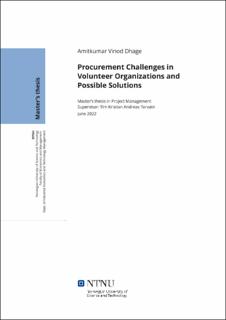| dc.contributor.advisor | Torvatn, Tim Kristian Andreas | |
| dc.contributor.author | Dhage, Amitkumar Vinod | |
| dc.date.accessioned | 2022-10-04T17:21:21Z | |
| dc.date.available | 2022-10-04T17:21:21Z | |
| dc.date.issued | 2022 | |
| dc.identifier | no.ntnu:inspera:116381271:116549627 | |
| dc.identifier.uri | https://hdl.handle.net/11250/3023753 | |
| dc.description.abstract | Hensikten med denne studien er å undersøke hvilke utfordringer frivillige organisasjoner opplever under anskaffelsesprosessen, som har en direkte og indirekte innflytelse på deres kapasitet til å lykkes med å gjennomføre prosjektene og oppdragene de er forpliktet til. Etter analysen av disse hindringene, er neste trinn å undersøke opprinnelsen og arten av disse utfordringene i større dybde, noe som vil hjelpe til med å utforske potensielle løsninger på disse problemene. For å oppnå dette målet ble teoretiske forslag utviklet med støtte fra eksisterende forskning og litteratur, og de ble vurdert ved å bruke empiriske data innhentet for å se hvor godt forestillingene samsvarte med atferd i den virkelige verden.
Fordi det ikke er gjort mye forskning på anskaffelsesprosesser i frivillighetssektoren, ble en deduktiv og induktiv forskningstilnærming brukt, med mål om først å utarbeide den hypotetiske modellen og teste den med de innsamlede dataene, og deretter bruke de innsamlede dataene. å utvide funnene i den utarbeidede modellen. Lavere kjøpekraft, uetisk praksis, prosesser, dårlig oppbevaring av ansatte, lover og forskrifter, risiko, konflikter og ikke-strategisk natur var de åtte typene anskaffelsesutfordringer som ble avdekket i frivillighetssektoren av denne studien. Den ikke-strategiske karakteren av innkjøp, samt organisasjonskultur, har en betydelig innvirkning på innkjøpsfunksjonen i frivillige organisasjoner.
For å forstå begrensningene til frivillighetssektoren innen innkjøpsoperasjoner, har det blitt introdusert en teoretisk modell som illustrerer egenskapene som gjør innkjøpsfunksjonen i for-profit firmaer relativt mer effektiv sammenlignet med frivillige organisasjoner.
Denne forskningen har implikasjoner for utøvere i frivillighetssektoren, spesielt for kjøpere, organisasjoner og ledelse. Bare på kjøper-, organisasjons- eller ledernivå, eller en kombinasjon av to eller alle tre, kan løse de oppdagede utfordringene. Kjøpere bør fokusere på å bygge langsiktige, gjensidig fordelaktige partnerskap med leverandører. Organisasjoner bør legge et høyere fokus på å utvikle en sterk organisasjonskultur og regler som lar hver ansatt forstå hvorfor de bidrar med tid og krefter til organisasjonen. Ledelsens ansvar bør være å garantere at de angitte organisasjonspolitikkene følges og at de ansattes kunnskap og ferdigheter forbedres. | |
| dc.description.abstract | The purpose of this study is to investigate at the challenges experienced by volunteer organizations during the procurement process, which has a direct and indirect influence on their capacity to successfully execute the projects and missions for which they are committed. Following the analysis of these obstacles, the next stage is to investigate the origin and nature of these challenges in greater depth, which will assist in the exploration of potential solutions to these problems. To achieve this goal, theoretical propositions were developed with the support of existing research and literature, and they were assessed using empirical data acquired to see how well the notions matched real-world behaviors.
Because there hasn't been much research done on procurement processes in the volunteer sector, a deductive, and inductive research approach were used, with the goal of first preparing the hypothetical model and testing it with the collected data, and then using the collected data to extend the findings in the prepared model. Lower Purchasing Power, Unethical Practices, Process, Poor Staff Retention, Law & Regulations, Risk, Conflicts, and Non-Strategic Nature were the eight types of procurement challenges uncovered in the volunteer sector by this study. The non-strategic nature of purchasing, as well as organizational culture, have a significant impact on the procurement function in volunteer organizations.
To understand the constraints of the volunteer sector in the field of procurement operations, a theoretical model has been introduced that illustrates the traits that make the procurement function in for-profit firms comparatively more efficient as compared to volunteer organizations.
This research has implications for practitioners in the volunteer sector, particularly for buyers, organizations, and leadership. Only on the buyer, organizational, or leadership levels, or a combination of two or all three, may solve the discovered challenges. Buyers should focus on building long-term, mutually beneficial partnerships with suppliers. Organizations should place a higher focus on developing a strong organizational culture and rules that allow each employee to understand why they are contributing their time and effort to the organization. The responsibility of the leadership should be to guarantee that the stated organizational policies are followed and that the knowledge and skills of the employees are improved. | |
| dc.language | eng | |
| dc.publisher | NTNU | |
| dc.title | Procurement Challenges in Volunteer Organizations and Possible Solutions | |
| dc.type | Master thesis | |
